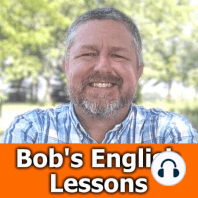4 min listen

Learn the English Phrases STRIKE UP and STRIKE ONE
Learn the English Phrases STRIKE UP and STRIKE ONE
ratings:
Length:
4 minutes
Released:
Dec 1, 2020
Format:
Podcast episode
Description
Read along to practice your English and to learn the English phrases STRIKE UP and STRIKE ONEIn this English lesson, I wanted to help you learn the English phrase, strike up. We use this phrase mostly when we're talking about starting a conversation with someone. If I go somewhere and I see someone I know on the other side of the room, I might walk over and strike up a conversation with them. If I'm at a party and there's a person that I really want to talk to, at some point I might walk over and I might strike up a conversation with them. So again, when you strike up a conversation with someone, it means simply that you go and you start having a conversation with them. You go and you start talking to them. If I was in an airport and someone recognized me and said, "Bob, the Canadian," I would probably strike up a conversation with them. That would be really cool, by the way, if I ran into someone who knew who I was. That's never happened. Even though I have many, many subscribers on YouTube, no one has ever yelled out in public, "Hey Bob, the Canadian," and then struck up a conversation with me.WANT MORE ENGLISH LESSONS? GO TO YOUTUBE AND SEARCH, "BOB THE CANADIAN"#englishteacher #englishlessons #speakingenglish #bobthecanadianAnyways, the second phrase I wanna teach you today is the phrase, strike one, and also strike two and strike three. Baseball is a sport where you have a number of chances to hit the ball. But if you swing and miss it's strike one. We use this phrase when we're talking to people as well. I actually use it with my students when they're not behaving well in class. I'll say to a student, "Look, you really need to stop talking and you need to get your work done. And because I need to warn you that's strike one." Okay, then the student knows that if I catch them talking and not doing their work again, it will be strike two. And then when we get to strike three, I'll probably make them go and talk to the principal.So once again, to review, when you strike up a conversation, it means you start having a conversation with someone. And when you use the strike system, when you tell someone that, "That's strike one," you mean that they have been warned. They have two more chances and then something's going to happen that they probably won't like.Hey, let's look at a comment from a previous video. Sorry, I'm sitting out here sort of in the rain. I'm actually underneath the hatch of my van right now, because it's raining a little bit. So my camera's out of the rain, but I'm still kind of in it. But let's look at a comment from a previous video. This is from Padma and Padma says, "Hello, teacher Bob. When I see certain," sorry, "When I see certain titles of your videos, I always think these phrases are so unusual. But then on the TV show, "Friends," I hear many of them. And I say, "Oh, they are so common." And my response is this. "I'm happy to hear that. I get all of my phrases from everyday conversations. I'm always on the lookout for phrases that native English speakers use when I'm talking to them. And then I write them down quickly so that I can make a lesson about it. It has left me thinking that English is a bit of a strange language." So yeah, that one of the side-effects of teaching English is that as I study the English language, in order to teach it to you, I've been starting to realize that the language is kind of strange. Sorry, I forgot to thank Padma. Thanks Padma, for the comment.Support the show (https://www.patreon.com/bobthecanadian)
Released:
Dec 1, 2020
Format:
Podcast episode
Titles in the series (100)
Learn the English Phrases SPOILED BRAT and ROTTEN APPLE by Bob's Short English Lessons